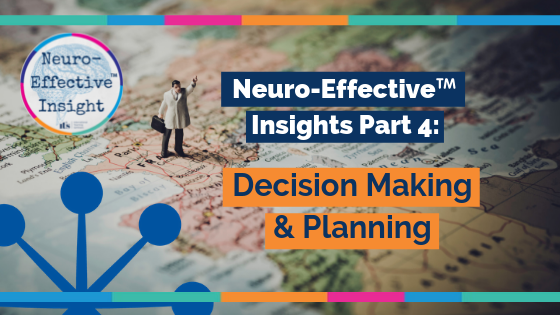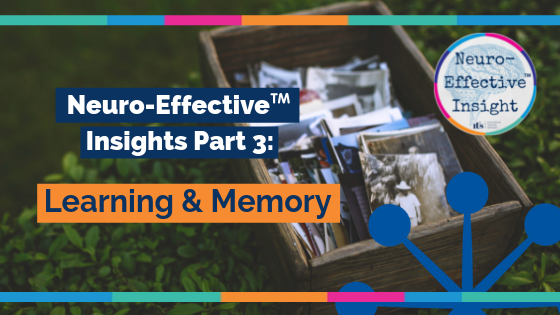Neuro-Effective™ Insights: Part 4 Decision Making & Planning
Decision making is ubiquitous in our lives – we make decisions many hundred times per day. Some of these are relatively trivial – like what to have for breakfast. And others have much greater magnitude – deciding what house to buy, who to have as a life partner, or how to restructure an organisation.
When we make a decision, the brain determines what the expected value of a successful outcome will be for this decision. There are a wide range of factors that can impact this expected value – our attitude to risk, previous experiences, perceived stress and complexity, to name but a few. Considering these on an individual level is one thing – but they also exist on team and organisational culture levels.
Neuro-Effective™ Insights
Neuro-Effective™ Insight #10: Fast and slow decision making
How do you make decisions or plan? How do you navigate through a busy street and not bump into anyone? We are constantly making decisions about speed and direction – but that’s not all.
We have not one, but at least two, decision making systems in the brain. This begs the question, are they both equally reliable and when should we use which one? To answer this question we need to understand how each system works, the types of decisions each is commonly used to make, and how we might become more aware of which system we are using.
This will help us to understand the difference between making decisions based on our gut versus rational thinking. When we make this distinction we can begin to address some of the questions people often have – for example, how much faith should you have in each system? Or again, does the brain use different information when using one decision making process or the other? Lots of questions, and the good news is that you can learn when to use which one.
Neuro-Effective™ Insight #11: Decision making in complexity
When we become parents or when we move up the ladder of success in the workplace, we are required to make decisions and plan for events that affect a number of different people’s lives – sometimes in highly significant ways. We may also be responsible for bigger budgets and financial planning at work.
We live in turbulent times and it feels as if the decisions we have to make are becoming increasingly complex. How does our brain deal with complexity? Understanding the way we make decisions when dealing with complexity can help us make better decisions.
In situations when you are not entirely clear what all the elements are but you still need to make a decision, a little understanding of how the brain is wired can really help.
Neuro-Effective™ Insight #12: Temporal Discounting
Why do we procrastinate? Is a bird in the hand always worth two in the bush? Why does it feel easier for some people to spend today rather than save for tomorrow? Each of these questions pitches a reward in the moment against a future reward. Understanding how the brain represents our current self and our future self can help us to choose whether taking a reward now is really better for us than waiting for something that might be better for us in the future.
Understanding how the brain computes time can increase motivation, help plan and take action sooner.
There is a whole world to explore here which offers us a whole new way of thinking – and a unique power to transform.
With that comes more choice and more ability to make a difference in a way that matters to you. To read more, take a look at the other 4 parts of this Neuro-Effective™ Insights series:
Being Neuro-Effective™: the 5 key areas where neuroscience can give you the edge
Neuro-Effective™ Insights Part 1: Emotional Regulation & Motivation
Neuro-Effective™ Insights Part 2: Creativity & Insight
Neuro-Effective™ Insights Part 3: Learning & Memory
Neuro-Effective™ Insights Part 5: Stress, Resilience & Contemplation
To immerse yourself in this way of thinking and learning, then join us in our upcoming Brain & Behavioural Change Programme that we co-created.
This article is co-authored by Ian McDermott and Professor Patricia Riddell





Leave A Comment